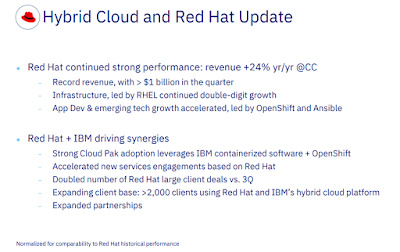IBM posted 4Q10 revenue of $21.8 billion, up 0.1 percent, with GAAP EPS from continuing operations of $4.11. Red Hat revenue was up 24 percent. Total cloud revenue was $6.8 billion, up 21 percent.
Highlights by segment:
- Cloud & Cognitive Software (includes Cloud & Data Platforms which includes Red Hat; Cognitive Applications; and Transaction Processing Platforms) — revenues of $7.2 billion, up 8.7 percent (up 9.4 percent adjusting for currency), led by cloud, Security, and IoT; Cloud & Data Platforms, up 19 percent (up 20 percent adjusting for currency); Cognitive Applications, up 1 percent; Transaction Processing Platforms, up 3 percent (up 4 percent adjusting for currency).
- Global Business Services (includes Consulting, Application Management and Global Process Services) — revenues of $4.2 billion, down 0.6 percent (down 0.3 percent adjusting for currency), with growth in Consulting, up 4 percent.
- Global Technology Services (includes Infrastructure & Cloud Services and Technology Support Services) — revenues of $6.9 billion, down 4.8 percent (down 4.0 percent adjusting for currency).
- Systems (includes Systems Hardware and Operating Systems Software) — revenues of $3.0 billion, up 16.0 percent (up 16.5 percent adjusting for currency), led by IBM Z, up 62 percent (up 63 percent adjusting for currency); Storage Systems revenue grew 3 percent.
- Global Financing (includes financing and used equipment sales) — revenues of $301 million, down 25.3 percent (down 24.9 percent adjusting for currency); revenue reflects the wind-down of OEM commercial financing.









